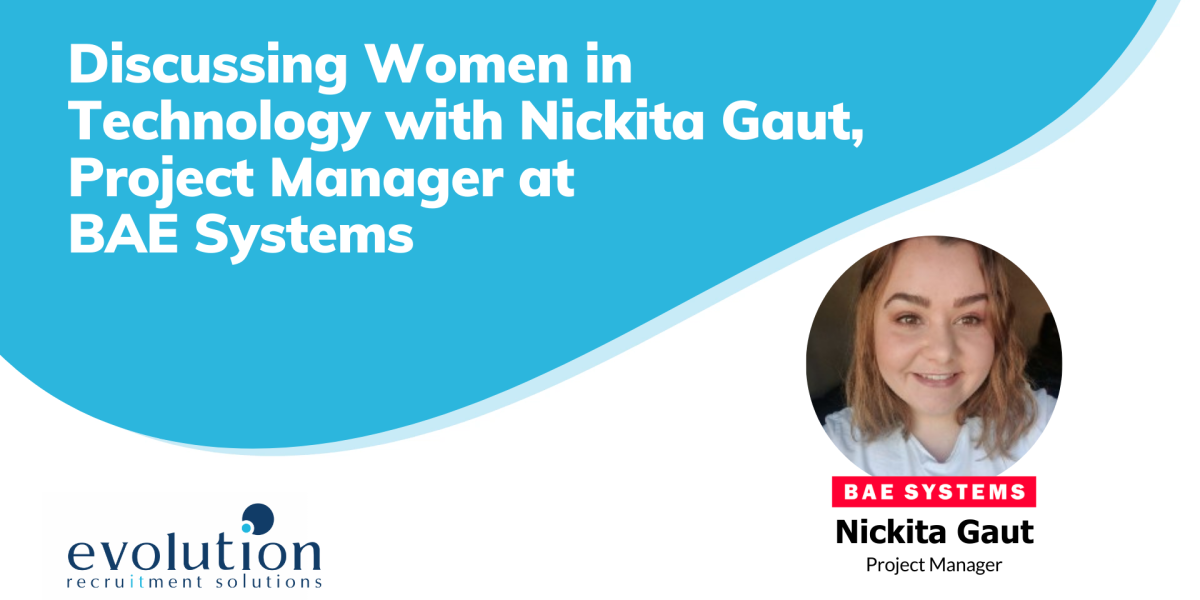
Nickita Gaut, Project Manager at BAE, took an unusual route into her career. She studied English at university but, at the end of her degree, wasn’t keen on traditional roles in publishing or creative writing. She reached out to her university career centre for some options. On taking a test which aligned personal preferences with work habits, she was given several options, the top two being DJ and project manager.
“I started applying for project management schemes and just happened to get one in the tech industry, at a company called Atos. It was really coincidental, but I fell into it knowing nothing about tech when I started. I picked up Project Management really easily because I’m quite an organised person so it comes very naturally to me, but the tech I had to learn as I have progressed.”
From this chance entry into the world of project management, Nickita completed her graduate scheme at Atos before being headhunted by BAE Systems several years later.
“Atos was a really big company so it provided me lots of opportunities to move around and get different experiences, but it almost felt like I was drowning because it was so big. When BAE headhunted me and I researched a bit more about what they do, I was very enticed to move over to a medium sized company focused on cyber.”
Coming into the project management world without experience of technology or engineering, Nickita quickly learnt the need to be resilient. As a young graduate leading teams almost entirely made up of men, Nickita found herself having to constantly prove her skills.
“One of the worst things about being a young female in the tech industry is that unfortunately I will have to repeatedly prove myself, I’ll have to prove that I’m good two or three or four times in different projects before colleagues believe it. But my male counterpart, at the same level as me will be inherently respected without needing to prove themselves. It’s like you’re having to build your own reputation completely from scratch, or not even from scratch, from a disadvantage. That can be quite tough. You’ve got to be quite resilient and determined to deal with that.”
Nickita believes that businesses need to do more to attract female graduates into schemes such as the one she undertook. Whilst her own graduate scheme was diverse in the project management discipline, the graduate intake overall was heavily male dominated. It meant that those coming through to leadership level were, and still are, mostly men. Acknowledging that there is a focus on STEM subjects to recruit for these graduate schemes, which tend to have more male students, ignores that a variety of skills are needed for project management – not necessarily STEM knowledge. If Nickita hadn’t taken that test, she would have been overlooked by recruiters for the role.
“I think decision makers believe the answer is to focus STEM recruitment on the women in these areas. But you can’t just keep pushing the problem down the chain. You’ve got to adapt how you engage as well.”
Women bring different and varied skillsets to project management roles and for Nickita it is the way she uses her skills to engage with her team and clients that enables her to succeed in her role.
“Women bring a different perspective and a different way of approaching situations. The way that I approach projects or the way that I approach dealing with teams or engaging with my customers, is not something that I would be as successful with, if I wasn’t a woman and didn’t allow my experiences to influence that approach.”
Nickita’s successful career has given her a wealth of experience to support those who are following in her footsteps. Firstly, it is important not to shy away from fear. Fear can stop you from asking questions which, in turn, stops you from being able to learn, engage with others and develop in your career. A fear of making mistakes can be debilitating, but – as Nickita points out – it’s important to keep perspective.
“Have no fear. When I first started in my career, I was so worried about making a mistake. It took me a long while, until someone that I used to work with said, “you’re probably going to make a mistake at some point, and you’re going to feel like an idiot, but no one’s going to die”. That I understood everyone had to learn at some point and that is okay. It is in those opportunities, the time after you’ve made a mistake, or failed, that you will learn the most in your career and develop the fastest.“
Additionally, Nickita is keen to highlight the importance of maintaining your sense of self in a corporate environment. Bringing things such as your sense of style, your accent, and things you are passionate about into the office helps to allay the image of corporate workers being men in suits and reminds everyone that you’re all just people first and foremost. As Nickita succinctly puts it:
“Just because you’re a personable person, doesn’t mean you can’t be professional.”